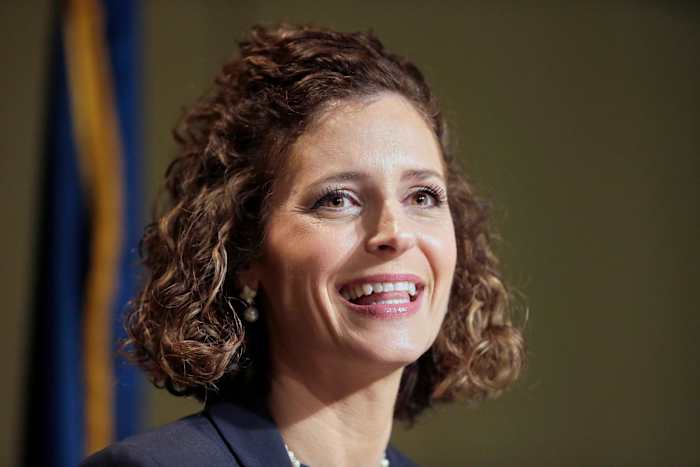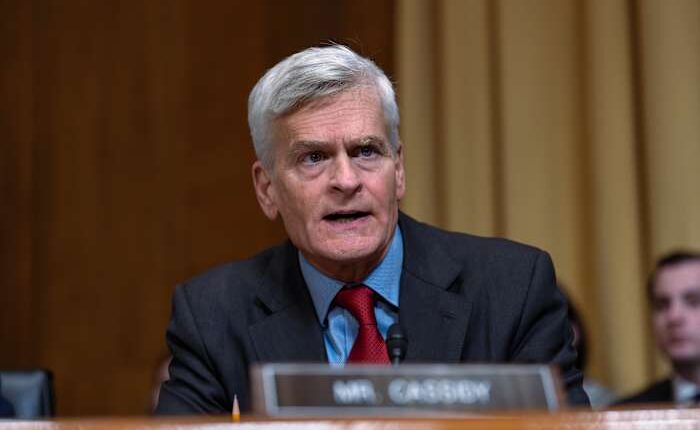
According to multiple sources familiar with the situation, President Donald Trump and Louisiana Gov. Jeff Landry have had conversations about U.S. Rep. Julia Letlow potentially running against U.S. Sen. Bill Cassidy in the upcoming Republican primary.
The move by the Republican governor to support a new contender against Cassidy highlights concerns within Trump’s support base regarding the two-time senator. Cassidy’s decision to vote for Trump’s conviction in the 2021 impeachment trial related to the Capitol riot on January 6, 2021, has not sat well with some. Additionally, as a medical professional, Cassidy publicly questioned Trump’s choice of Robert F. Kennedy Jr. for the position of health secretary before ultimately voting to confirm Kennedy.
Despite Republicans currently holding a 53-47 majority in the Senate and having a promising outlook for the 2026 midterm elections, Cassidy and other GOP senators facing reelection next year are encountering tough primary challenges due to their previous actions distancing themselves from Trump.
For the senator, “the biggest hurdle is going to be the impeachment vote. That’s what he has to overcome. And I don’t think he has the mindset to say, ‘I made a mistake,’” said Eddie Rispone, the Republican nominee for Louisiana governor in 2019 and a Cassidy supporter. “And Louisiana is a big Trump state.”
Landry, a close Trump ally, spoke last month with the president about Letlow as a potential Senate candidate, according to two people with knowledge of the conversation. They were granted anonymity to share contents of a conversation they were not authorized to discuss publicly.
A spokesperson for Letlow declined to comment on a potential campaign for Senate or the discussion between Landry and Trump. Landry’s office declined to comment.
Landry, elected in 2023, has been advocating for Letlow to consider a run, according to the people who confirmed their April conversation about Letlow. A Senate seat would be a safe bet for a Republican given that Trump received 60% of the vote in carrying Louisiana last year.
Republican insiders describe Landry and Cassidy not as close, but as having a cordial working relationship despite a difference in their feelings of loyalty to Trump, which creates some distance between Cassidy and segments of the party base in the state.
“Senator Cassidy delivers conservative results for the people of Louisiana,” Cassidy spokesperson Ashley Bosch said in a statement. “He’s worked hard to support the President’s agenda and we’re confident voters will re-elect him next year.”
Letlow is a three-term Republican representative from northeast Louisiana. She won the seat in a special election in March 2021 after her husband, Luke, had been elected but died of complications from COVID-19.
Letlow sits on the influential House Appropriations Committee. Her district was a mostly rural swath of northeast Louisiana when she arrived in Congress. It has shifted as a result of a redistricting map ordered by the U.S. Supreme Court in 2024 and now also include parts of metropolitan Baton Rouge, where Cassidy lives.
Cassidy already faces one major challenger, Louisiana State Treasurer John Fleming, a former congressman.
Some Republican activists in the state condemned Cassidy for his 2021 vote to convict Trump, a vote Cassidy said afterward he was “at peace” casting.
The state Republican executive committee voted unanimously to censure Cassidy. The Republican committee in Bossier Parish, which includes the city of Shreveport in northwest Louisiana, adopted a censure measure describing Cassidy as “an object of extreme shame” and called for his resignation.
Trump revived his public contempt for Cassidy a year ago after the senator spoke out when the then-former president promised to pardon those convicted in connection with the Capitol riot; Trump did that after taking office in January.
In an April 2024 post on Truth Social, Trump called Cassidy “one of the worst Senators in the United States Senate” and a “disloyal lightweight.”
Louisiana’s new congressional primary election system also could be a wrinkle for Cassidy.
Until the new system was adopted this year, congressional candidates from all parties seeking the same office ran on the same ballot regardless of party affiliation. In these so-called jungle primaries, only a candidate who received 50% of the vote would win the office outright. If no one reached the threshold, the top two finishers would face each other in a runoff.
Next year, only voters who note Republican affiliation on their voter registration — and those who affiliate with no party — will be able to participate in the GOP Senate primary. The effect is seen as a potential challenge for Cassidy, who had benefited from the less-partisan nature of the old system.
“It does tighten it a little bit for him, because you do have the far-right Republicans — for them, it’s going to be hard to forgive him for that impeachment vote,” Rispone said.
Still, Cassidy has a clear fundraising advantage, with more than $7.4 million in his campaign account at the end of the first quarter. Cassidy has also begun laying the campaign groundwork in Louisiana and is expected to announce his candidacy formally in the coming weeks.
And in a sign things might not be as bad with Trump as they were, Cassidy received different sort of recognition from the president at an economic event at the White House this month.
“We have some great people, great senators, here,” Trump said. “Bill Cassidy, thank you, Bill.”
Copyright 2025 The Associated Press. All rights reserved. This material may not be published, broadcast, rewritten or redistributed without permission.

















